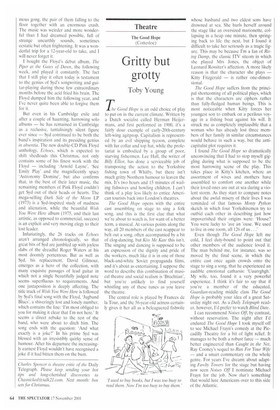Theatre
The Good Hope (Cottesloe)
Gritty but grotty
Toby Young
he Good Hope is an odd choice of play to put on in the current climate. Written by a Dutch socialist called Herman Heijermans, and first performed in 1900, it's a fairly dour example of early-20th-century left-wing agitprop. Capitalism is represented by an evil shipping tycoon, complete with fur collar and top hat, while the proletariat is embodied by a group of poor, starving fishermen. Lee Hall, the writer of Billy Elliot, has done a serviceable job of transposing the action to the Yorkshire fishing town of Whitby, but there isn't much gritty Northern humour to leaven the mix. It's two hours and 15 minutes of wailing fishwives and howling children. I can't think of a play less likely to entice American tourists back into London's theatres.
The Good Hope opens with the entire cast assembling on stage to sing a folk song, and this is the first clue that what we're about to watch is, for want of a better term, a musical. At various points along the way, all 20 members of the cast reappear to belt out a song, often accompanied by a bit of clog-dancing, but Kiss Me Kate this isn't. The singing and dancing is supposed to be an expression of the dignity and pride of the workers, much like it is in one of those black-and-white Soviet propaganda films, and it's about as entertaining. I suppose the word to describe this combination of musical theatre and social realism is 'Brechtian', but you're unlikely to find yourself whistling any of these tunes as you leave the theatre.
The central role is played by Frances de la Tour, and the 56-year-old actress certainly gives it her all as a beleaguered fishwife
whose husband and two eldest sons have drowned at sea. She hurls herself around the stage like an oversized marionette, collapsing in a heap one minute, then springing back to life the next, but I found it difficult to take her seriously as a tragic figure. This may be because I'm a fan of Rising Damp, the classic ITV sitcom in which she played Mrs Jones, the object of Leonard Rossiter's affection. A more likely reason is that the character she plays — Kitty Fitzgerald — is rather one-dimensional.
The Good Hope suffers from the principal shortcoming of all political plays, which is that the characters are ciphers rather than fully-fledged human beings. This is most noticeable when Kitty forces her youngest son to embark on a perilous voyage in a fishing boat against his will. It struck me as completely implausible that a woman who has already lost three members of her family in similar circumstances would behave in such a way, but the anticapitalist plot requires it.
I found The Good Hope so dramatically unconvincing that I had to stop myself giggling during what is supposed to be the most harrowing scene of the play. This takes place in Kitty's kitchen, where an assortment of wives and mothers have assembled to comfort one another while their loved ones are out at sea during a violent storm. As they start to compare notes about the awful misery of their lives I was reminded of that famous Monty Python sketch in which four Yorkshiremen try to outbid each other in describing just how impoverished their origins were: 'House? You were lucky to 'aye an 'ouse. We used to live in one room, all 126 of us Even though The Good Hope left me cold, I feel duty-bound to point out that other members of the audience loved it. The man behind me, for instance, was so moved by the final scene, in which the entire cast once again crowds onto the stage to sing a song, that he experienced an audible emotional catharsis: 'Uuurrghgh.' My wife, too, found it a very powerful experience. I think it's fair to say that if you're a member of the educated, Guardian-reading middle class The Good Hope is probably your idea of a great Saturday night out. As a Daily Telegraph reader, however, I'd prefer to watch Blind Date.
I can recommend Noises Off, by contrast, without reservation. The night after I'd endured The Good Hope I took myself off to see Michael Frayn's comedy at the Piccadilly Theatre for a bit of light relief. It manages to be both a robust farce — much better engineered than Caught in the Net, Ray Cooney's sequel to Run For Your Wife — and a smart commentary on the whole genre. For years I've dreamt about adapting Fawhy Towers for the stage but having now seen Noises Off I nominate Michael Frayn for the job. Now that's something that would lure Americans over to this side of the Atlantic.






















































































 Previous page
Previous page